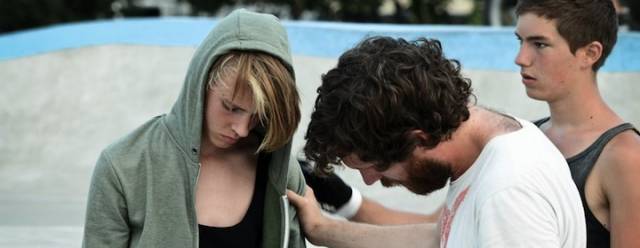
 Violet directed by Bas Devos is set in a city that's under constant surveillance. With cameras everywhere, and guards monitoring our lives, one would think that, among all the reasons for surveillance, we’d also be safer. But tragedy strikes in the blink of an eye, while a security guard is taking a phone call, as two BMXers are senselessly attacked as they make their way through a mall. Jonas is stabbed while Jesse (Cesar de Sutter) stands by, helpless, frozen. The aftermath plays havoc on Jesse’s life as he suffers from PTSD, tries to answer confused comments from this friends about Jonas' death, while absorbing verbal attacks from people accusing him of cowardice.
Violet directed by Bas Devos is set in a city that's under constant surveillance. With cameras everywhere, and guards monitoring our lives, one would think that, among all the reasons for surveillance, we’d also be safer. But tragedy strikes in the blink of an eye, while a security guard is taking a phone call, as two BMXers are senselessly attacked as they make their way through a mall. Jonas is stabbed while Jesse (Cesar de Sutter) stands by, helpless, frozen. The aftermath plays havoc on Jesse’s life as he suffers from PTSD, tries to answer confused comments from this friends about Jonas' death, while absorbing verbal attacks from people accusing him of cowardice.
While the opening of the film primes viewers for an eventful narrative that will take them from the stabbing to a fulfilling resolution, this does not happen. The events stagnate and Jesse does not grow as a character. The film stays put and allows us to feel his struggle, his pain and perhaps his guilt, though it never seems that he feels he should have acted differently. Sparse dialogue, and the use of wide, long-lasting shots seem to be attempts to keep the viewer rooted in Jesse’s present, from stopping our mind from wandering and wondering, but these techniques are not totally effective. There is a disconnect between the events and the camera work.
While the shots are beautiful, many times they seem meaningless in the context of the story. There is a yeaning for Jesse’s character to grow, to change, to come to terms with the tragedy. Late in the film every shift in scenery keeps the viewer hoping, maybe we'll witness revenge, or retribution! The twistedness of Jesse's soul in the present is not enough to carry the film alone. This film sits on a fine line. With a story as intense as this, we need to either be invested in the characters through the action, or be disengaged from it through aesthetics. Neither happens to a high enough degree for this film to truly succeed.